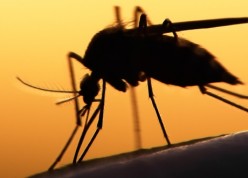News
House of Lords Science and Technology Committee publishes report on GM insects
The House of Lords Science and Technology Select Committee has concluded that there is a moral duty to test the potential of genetically modified insects, as it publishes today the findings of its inquiry on GM insects.
 According to the Committee’s report, genetically modified insects have significant potential to address problems raised by infectious disease and agricultural pests. It calls for a field trial to test the "efficiency" of the EU regulatory process in this area and generate public engagement and debate.
According to the Committee’s report, genetically modified insects have significant potential to address problems raised by infectious disease and agricultural pests. It calls for a field trial to test the "efficiency" of the EU regulatory process in this area and generate public engagement and debate.
The Chair of the Nuffield Council, Professor Jonathan Montgomery, gave evidence to the Committee, drawing on the findings of previous Council work, including our recently published findings of our examination of'‘naturalness', and our reports on emerging biotechnologies (2012), and GM crops (1999 and 2003).
He urged the committee not to focus just on the ethics of GM insects, but to consider the wider context in which such technologies are being considered and used, and the alternative ways that global challenges such as disease control and food security might be addressed:
"Our report on emerging biotechnologies drew attention to the importance of reflecting on the extent to which decisions we take to use or not use particular technologies tend to drive us down pathways which have consequences for crowding out other possible research agendas. We therefore need to have a debate quite early on about these technologies versus other promising ways to look forward", said Professor Montgomery.
Such a debate would need to engage a broad range of interests and a broad section of society, not only regulators, expert committees and the companies developing the technologies.
This was underlined by Council member Sir Roland Jackson, giving evidence on behalf of Sciencewise, who highlighted the potential for public dialogue to support policy making in this area.
Some echoes of this are found in the Committee’s report which states that “rather than focusing on the GM insect technologies themselves, it will be important to frame a public engagement initiative around the wider problems that the technologies have been designed to address.” (Paragraph 164)
The Council’s call for evidence relating to genome editing – which includes questions on gene drives and control of disease vectors – is open until February 1. Our blog features a series of posts on the scientific and public debate around these technologies including a new post by Andy Greenfield, Chair of the Council’s Working Group on genome editing, reflecting on the recent international summit on genome editing.
Read the Council’s written response to the inquiry.
 According to the Committee’s report, genetically modified insects have significant potential to address problems raised by infectious disease and agricultural pests. It calls for a field trial to test the "efficiency" of the EU regulatory process in this area and generate public engagement and debate.
According to the Committee’s report, genetically modified insects have significant potential to address problems raised by infectious disease and agricultural pests. It calls for a field trial to test the "efficiency" of the EU regulatory process in this area and generate public engagement and debate.The Chair of the Nuffield Council, Professor Jonathan Montgomery, gave evidence to the Committee, drawing on the findings of previous Council work, including our recently published findings of our examination of'‘naturalness', and our reports on emerging biotechnologies (2012), and GM crops (1999 and 2003).
He urged the committee not to focus just on the ethics of GM insects, but to consider the wider context in which such technologies are being considered and used, and the alternative ways that global challenges such as disease control and food security might be addressed:
"Our report on emerging biotechnologies drew attention to the importance of reflecting on the extent to which decisions we take to use or not use particular technologies tend to drive us down pathways which have consequences for crowding out other possible research agendas. We therefore need to have a debate quite early on about these technologies versus other promising ways to look forward", said Professor Montgomery.
Such a debate would need to engage a broad range of interests and a broad section of society, not only regulators, expert committees and the companies developing the technologies.
This was underlined by Council member Sir Roland Jackson, giving evidence on behalf of Sciencewise, who highlighted the potential for public dialogue to support policy making in this area.
Some echoes of this are found in the Committee’s report which states that “rather than focusing on the GM insect technologies themselves, it will be important to frame a public engagement initiative around the wider problems that the technologies have been designed to address.” (Paragraph 164)
The Council’s call for evidence relating to genome editing – which includes questions on gene drives and control of disease vectors – is open until February 1. Our blog features a series of posts on the scientific and public debate around these technologies including a new post by Andy Greenfield, Chair of the Council’s Working Group on genome editing, reflecting on the recent international summit on genome editing.
Read the Council’s written response to the inquiry.